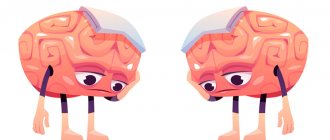In some diseases, the patient experiences a painful mental disorder, characterized by hostile thoughts and actions directed against his own personality. This condition is called auto-aggression. Self-destructive behavior can lead to dire consequences and cause death. To help patients suffering from this problem, the Leto mental health center prescribes specific treatment based on drug therapy and psychocorrection.
Causes of pathology
Auto-aggression is a painful response of the body to a critical situation.
Destructive behavior is caused by:
- Errors and deviations in raising a child. Constant humiliation, lack of love from elders, inflated demands, unfounded accusations and exaggeration of shortcomings, lack of attention, all of these formats can lead to the creation of a critical situation that destroys the threshold of stress resistance.
- Experienced violence, including sexual violence. An attack on a person often ends in self-destructive actions due to the resulting persistent stress.
- Fanatical devotion to ideas. Self-destruction can be driven by destructive religious faith, passion for aggressive esotericism, excessive love of diets, and the conviction of the need to increase physical activity to an exorbitant level.
- Dissatisfaction with professional employment. Often occurs when performing work that is contrary to existing desires.
- Family problems.
- Diseases that have a direct negative and powerful effect on the psyche.
- Hysterical personality accentuations.
Pros of auto-aggression
Auto-aggression itself, like many other symptoms of internal problems, initially has a positive function. For example, a child does not want to spoil the relationship with his parents, so he subconsciously directs all the anger towards himself.
The famous American psychiatrist Karl Menninger believed that, for example, self-mutilation is the concentration of a lethal impulse on one part of the body in order to avoid suicide. Only the hand is cut off, but the man himself remains alive. But, one way or another, in case of pronounced self-destructive behavior, you need to contact a specialist [RabotaYouth, 2021].
There is nothing wrong with a person being critical of his capabilities and abilities. Sometimes, to achieve a certain result, you just need to try and gather your will into a fist. But auto-aggression is always destructive. There is a certain relationship between personality traits and the tendency to self-destruct. For example, a young man with whom his lover has broken off may purposefully injure himself in order to attract her attention.
The reason why self-aggression in adults is increasingly common in society is because of its special benefit for the patient. With its help, you can let go of unbearable feelings or, conversely, force yourself to feel at least something, distract yourself from an unbearable situation or gain control over it, while remaining with the same mask of friendliness, calmness and well-being on your face.
There are no bad emotions and feelings: anger has the same right to exist as love. And suppressing this anger can easily lead to withdrawal or an outburst of aggression directed at weaker people.
Kinds
There are several classifications of auto-aggression. The doctor is primarily interested in the main component – the cause of the disease.
In accordance with etiological factors, the following forms of self-destruction are distinguished:
- Mental. It includes personality traits that, under the influence of internal and/or external stimuli, are reduced into self-destructive actions. The main manifestations are self-blame and self-abasement.
- Physical. The symptoms of this type of disorder are dominated by actions accompanied by violence against one’s body. The patient is capable of hitting himself, making punctures and cuts.
- Social. The patient isolates himself from communication and strives to become an outcast from society. At the same time, he has a paradoxical joyful reaction from the fact that people begin to react negatively to the sick person.
- Moral. Characterized by dependencies. Suffering from alcoholism or drug addiction, a person deliberately isolates himself from other people, undergoes self-exhaustion, and emotional devastation.
Establishing the characteristics of this nature allows the psychiatrist to take a more selective approach to the treatment of deviation.
An effective way to get rid of auto-aggression
Due to the fact that treatment of auto-aggressive disorder can begin at any stage, there is a high probability of quickly getting rid of the problem with a responsible attitude to therapy. Having determined the true causes of the illness at a meeting with a specialist, it is important to jointly find effective ways to overcome unbearable experiences, which will differ in each individual case. A competent psychologist can select ideally suited techniques and methods that can easily fit into the habitual lifestyle of a person with an auto-aggressive disorder in order to correct behavior day after day.
Symptoms and complications
Signs of auto-aggression can be both direct and indirect. In any case, the manifestations of this painful phenomenon are based on self-destruction. Symptoms vary widely.
Direct autodestruction most often includes:
- Hitting your head against the wall, floor.
- Cutting and biting yourself.
- Tearing skin with nails.
- Hair pulling, etc.
Indirect self-harm looks like:
- Tattoos.
- Specially made scars.
- Wearing objects that disfigure the body.
Other manifestations of auto-aggression include:
- Suicidal direction - thoughts of suicide, planning, thinking about details, making attempts.
- Food form as part of anorexia and bulimia.
- Substance abuse, alcoholism and drug addiction.
- Fanaticism (religious, sports, political).
Extreme sports can become painful very quickly.
Delayed treatment leads to:
- Depression.
- Severe psychosomatic diseases.
- Traumatization.
- Infectious diseases.
- Lethal outcome.
Complications
Without psychotherapeutic help, severe manifestations of auto-aggression result in death as a result of suicide attempts, overdose of psychotropic substances, and alcohol. Other consequences include depression, which progresses against a background of guilt and repressed aggression. If this is already familiar to you, or you know someone who has experienced depression, then read the instructions on how to help a person who suffers from this disease .
In addition to the above-mentioned complications, a self-destructive personality runs the risk of physical injury and physical illness. The most common are muscle and ligament sprains, bruises, fractures of the limbs and spine, skin infections, severe intoxication and coma.
How to start treatment for auto-aggression at the Leto clinic
The contact phone number of our medical center is 8(969)060-93-93 . Before coming to us, call the number provided. The call center operates around the clock as a hotline. The dispatcher-registrar will answer all your questions and make an appointment with a doctor. If you need immediate help, you can come right away and you or your relative will be examined by the doctor on duty. If necessary, it is possible to transfer the patient from home to the clinic. It would be useful to remind you that all types of diagnostics and therapy are anonymous. The option to order a call back is available directly from the website.
Signs of a mental disorder
Due to the fact that adults tend to hide manifestations of aggression, fearing a negative reaction from the environment, it is quite difficult to recognize a progressive disorder in time. However, some symptoms may eloquently indicate the development of auto-aggression:
- the presence of fresh wounds, burns, bruises;
- manifestation of suicidal tendencies;
- openly expressing a desire to disappear;
- frequent repetition of words about one’s own inferiority;
- desire for privacy on an ongoing basis.
If any of these symptoms are detected, you should immediately start a conversation with the person, who should be convinced of the importance of visiting a psychologist for a speedy diagnosis. Despite the fact that auto-aggression is a defense mechanism against a situation that is unpleasant for a healthy psyche, such a disorder often develops in people with an unstable nervous system and increased emotionality. Auditory and visual hallucinations can also cause the progression of the disease.
Sometimes auto-aggression occurs in children of any age, especially if they have experienced serious physical or emotional trauma. Also, careless rude phrases from parents towards a child can lead to the development of such a psychological illness.
Diagnostics
When making a diagnosis, great importance is attached to interviewing the patient and/or his relatives and answering questions. The conclusions obtained during the conversation are supported by inspection data. The psychiatrist tries to identify the root cause of existing disorders.
Psychodiagnostics is important. For these purposes the following are used:
- Questionnaires.
- Test methods.
- Questioning.
- Conversation with a psychologist.
- Treatment of auto-aggression
Some patients or their loved ones try to get rid of the existing problem on their own and spend a long time searching in different sources for the answer to the question: what to do. You should not waste time on self-diagnosis and self-medication - they often lead to loss of time and the appearance of serious (sometimes irreversible) complications.
At the first symptoms of auto-aggression, be sure to contact a psychiatrist. We try to find an individual approach to each patient. A treatment plan is drawn up after diagnosis. In this case, many factors are taken into account: the cause of the disease, its form, the severity of symptoms, weight, mental characteristics of the patient, etc. The treatment regimen for autoaggression includes only those techniques that provide the most effective results and the fewest side effects.
We use:
- Drug therapy.
- Psychotherapy.
- Medical and psychological rehabilitation.
Pharmacotherapy includes the following:
- Neuroleptics. Given in the presence of agitation, aggression, hysterical behavior, dangerous antisocial behavior.
- Sedatives. They are necessary to suppress phobias, mental attacks accompanying the disease and other manifestations accompanied by fears.
- Antidepressants. These drugs are required to eliminate clinical forms of depression. Selecting the most suitable one may take a long time. You will have to take it after discharge from the hospital.
- Symptomatic medications.
Psychotherapy methods:
- Individual conversations with a psychiatrist/psychologist.
- Sessions of persuasion and suggestion in reality.
- Hypnotherapy.
- Group and family psychocorrection.
- Art therapy.
- Cognitive behavioral therapy.
During the training, dominant mental ideas and reflexes are gradually eliminated.
What causes this behavior?
Aggression is divided into two types: passive and active. Due to improper upbringing, aggression flows into a passive state, that is, the child does not break anything in the house, does not hit his parents - he is angry with himself, hits, blames and bites. And not many parents are willing to admit some problems in their parenting model. They try to pretend that everything is fine without changing anything. But this aggression in a child does not go away - it will accumulate and develop into unspoken pain, the desire to do something very, very bad - to oneself or to someone else. This can lead to injury and even suicide.
There are several reasons why a child may behave this way. We need to consider them all.
Protest - a child is trying to prove something
If very young children do not have the right to choose and vote, which is logical, then from the age of 2 they begin to prove that they can do everything themselves. Yes, yes, these famous “I myself!” are also a form of protest. In general, this is not a bad character trait - a sign of leadership and reluctance to follow other people’s orders.
But sometimes this can go beyond the bounds of reason: a child can perceive any prohibition like a bull - a red rag. It is difficult for such children to give up what they want, because it seems to them that they are obliged to have it - this thing has been theirs since birth!
Such a reaction to what is happening can be caused by too strict parents, a bunch of prohibitions and restrictions. Imagine if all your desires were ignored, your will was suppressed, and your requests were not fulfilled. You may think that you would fight for your rights to the last, but in reality, if you are suppressed from birth, you are afraid of the “aggressor”. And fear is a feeling that goes very close to hatred, so children throw out emotions as best they can. That is why the child tries to fight injustice and limited freedom by directing anger and resentment towards himself.
What would be the wrong step in such behavior: shout at the child, hit him. As a result of punishment, the child will begin to cry even louder and beat himself even harder due to humiliation and injustice.
An effective parental response: gently prevent the child from harming himself, hug and reassure. Stay nearby, don’t shout and don’t blame the child for disobedience. You can try to interpret the child’s feelings: “I didn’t allow you to eat chocolate now and you were offended. We can eat it together after lunch.”
To ensure that situations in which your child seeks to harm himself occur less and less often, try to reconsider your rules and restrictions that you have set for your child. Perhaps you will see for yourself that there is no point in certain decisions, that you have gone too far somewhere.
Try to compromise with your child, he will see that you care - and this is the most pleasant thing.
Guilt - the child is trying to punish himself for something
In addition to children with obvious leadership qualities, there are children who have a weak nervous system. This happens when parents consciously limit the child, call him names, blame him and bully him for his appearance or something similar.
Let's consider a situation: a child breaks something (for example, a toy) and is trying to fix it himself. He does this with tears in his eyes, because he is not a master. The child hits and scolds himself for what he can’t do.
Because he knows what will happen later, when the parents see the breakdown. They will yell at him, call him names, and possibly beat him up. Hitting yourself does not help matters, but the child does not know what to do, he feels driven and already feels all the blows and hateful words that he will receive when he talks about the breakdown. Often this can lead to lies, like, I forgot the toy at my friend’s/grandmother’s place, everything is fine. A child can thus delay the inevitable, because the longer the parents do not know about his mistake, the more quiet time he has.
Unlike the first type, children with feelings of guilt do not rebel when they are shouted at or hit, they simply cry.
You can make the situation worse with the wrong punishment: lock him in a room, ignore him further, beat him even more or humiliate him. The result is still the same: the child continues to hit himself. In such situations, it is better to treat the child with understanding, because a toy - or the breakdown of any other thing - is not the end of life. You could try saying something like:
“Is it broken? Well, it’s okay, my sunshine, I still love you very much. We’ll fix the toy, and if we don’t succeed, we’ll get daddy! Don’t be upset, even if I get angry sometimes, I still love you very, very much.”
It is better not to criticize your child excessively, but to try to tell him more often that you love him.
"Want!" – the child wants to get something or manipulate
The third type of children are skilled manipulators. They can control their parents for a number of reasons: to get more love, attention, to hide their “crimes,” to get what they want. Sometimes even to make parents feel guilty.
In fact, almost all children are insanely good at achieving their goals through manipulation. Most often, this behavior is associated with errors in upbringing. Parents of such children constantly please their children, shower them with gifts and fulfill every whim. For such parents, children’s tears are horror and fear, which also cause a feeling of guilt, and the result is extremely favorable for the child: here’s a gift, hugs, do what you want, everything is allowed! It’s easy to understand that your child is a manipulator - he can start beating himself, secretly spying on his mother’s reaction - is she upset enough, should she add more tears and screams?
Specifically in this case, it would be a bad decision to immediately communicate nicely with the child and shower him with your love and attention. The fact that he was encouraged reinforces the child’s cycle of “I’ll cry and I’ll get what’s mine.”
In such a situation, it is better to react unexpectedly: leave the room, ask a question, distract the child with something. You can ask, “What are you trying to tell me?” Continue doing what you're doing, but say, "I want to know when you're angry." And if your child responds by admitting that he is angry right now, praise him for his honesty: “I’m glad you trust me and talk to me. Now I understand how you feel. When you beat yourself, I didn’t know what you wanted to say.”
Learn to switch the child's attention to something else - this confuses such manipulative children and he does not use that unwanted behavior.
All that can be said at the end is good luck to you, parents. Be strong and get ready to talk with your child, because dialogue is the foundation of healthy family relationships. Remember that violence or anger will not raise a happy and healthy person.
Cost of services
| CONSULTATIONS OF SPECIALISTS | |
| Initial consultation with a psychiatrist (60 min.) | 6,000 rub. |
| Repeated consultation | 5,000 rub. |
| Consultation with a psychiatrist-narcologist (60 min.) | 5,000 rub. |
| Consultation with a psychologist | 3,500 rub. |
| Consultation with Gromova E.V. (50 minutes) | 12,000 rub. |
| PSYCHOTHERAPY | |
| Psychotherapy (session) | 7,000 rub. |
| Psychotherapy (5 sessions) | 30,000 rub. |
| Psychotherapy (10 sessions) | 60,000 rub. |
| Group psychotherapy (3-7 people) | 3,500 rub. |
| Psychotherapy session with E.V. Gromova (50 minutes) | 12,000 rub. |
| TREATMENT IN A HOSPITAL | |
| Ward for 4 persons | 10,000 rub./day |
| Ward for 3 persons | 13,000 rub./day |
| Ward 1 bed VIP | 23,000 rub./day |
| Individual post | 5,000 rub. |
| PETE | 15,000 rub./day |
This list does not contain all prices for services provided by our clinic. The full price list can be found on the “Prices” , or by calling: 8(969)060-93-93. Initial consultation is FREE!
Treatment and prevention of auto-aggression
- Exclude (identify) pathology of the central nervous system (MRI of the brain, consultation with an epileptologist, neurologist)
- Identify the causes of abnormal behavior, bad mood, learn to cope with a traumatic situation (consultation with a psychotherapist)
- Drug treatment (nootropic, psychotropic drugs as prescribed by a doctor)
- Vitamin therapy
- Sport
- Autogenic training
A person can redirect aggressive energy into creativity, this often helps greatly in recovery. Because the free release of anger does not free a person, but, on the contrary, increases anger and forms a bad habit. At the psychological level, dissatisfaction with oneself, anger directed at oneself (or others), is opposed to acceptance and love.
Depending on the extent of the disease, there may be both drug and non-drug treatment options. As part of strategic psychotherapy, when working with auto-aggression, the technique of imposed symptom can be used. For example, a person who cuts himself should undress every day, stand in front of a mirror and touch the blade to the place where he wants to cut. If he cannot resist this urge, then he has exactly five minutes to cut himself. After this time, he must finish and wait until the next day to repeat everything again. Thus, a person, firstly, looks at himself from the outside at the moment of cutting, and, secondly, when he has five minutes, the pleasure of inflicting pain on himself is destroyed - it is no longer the symptom that controls the person, but the person - the symptom .
If you can’t cope with your feelings, don’t suppress them - contact professional doctors, they will help you understand and work through your emotions. Get rid of your problem, but not yourself. By acting, you will regain your good mood and joy of life.
If self-aggression is typical of someone close to you, do not ignore alarm bells. Show concern, be interested, delve into it. Remember, love can literally heal and save lives. Be sure to devote time to your children, relatives, family, and friends. Listen, reassure and support.
Auto-aggression in a child
Things that are guaranteed to lead to auto-aggression:
- Physical punishment (violence, beatings, orders to stand on your rump in the corner, etc.);
- Orders to “come up with your own punishment” (“You received a bad grade, now figure out what I can limit you in so that you think about your behavior”);
- Mental oppression of the child (“You study worse than your classmate Sasha, you are stupider than my friend’s daughter, you are too fat to eat cake”);
- Humiliation and ridicule of a child (even “kind” ones);
- Ignoring the baby’s problems related to social adaptation and communication abilities;
- Lack of tenderness and care on your part (especially during attacks);
- Leaving the child to his own devices (“If you don’t follow me now, I’ll leave!”, “Solve your problems yourself”);
- Active defense of the opponent in street or school conflicts (“You yourself provoked the quarrel! Zhenya is not to blame for anything!”).
If your child has a problem, help him in the following ways:
- Do not ask your child about what happened. Act on the principle of feedback, say affirmatively, “You are hurt, offended, you are angry.” Sooner or later, the child will give you a positive answer, and only then you will be able to understand in detail his psychological trauma;
- Do not under any circumstances say, “Nothing happened, you are not hurt.” The child may think that an authoritative person in your person considers his problem insignificant. And since he perceives it so subtly, it means he is bad, unwanted, strange;
- Draw with your child, but not quite standard pictures. Place your palms in gouache and make “scribbles” with your hands on a sheet of whatman paper;
- Don’t be shy to show tenderness, reassure your child, hug and kiss him more often;
- In any third-party conflict with your child, look for a constructive solution, not for those to blame.
You are an adult, you are responsible for your actions towards your child, and those actions will have consequences. The child is NOT to blame for your problems, his responsibility is to be a child, and he really needs your love.
Forecast and preventive measures
When undergoing full therapy and following all medical recommendations, prognostic expectations are quite favorable. A number of patients ask our psychiatrists how to completely get rid of a possible relapse of auto-aggression in the future. We offer them to undergo rehabilitation - a set of restorative and preventive measures that consolidate the results of treatment.
If you have a problem and you don’t know how to treat it, contact our Leto mental health center. Call 8(969)060-93-93 and we will make your well-being easier as soon as possible.
The material was prepared by Svetlana Gennadievna Yakunina, educational psychologist at the Center for Children's Education and Culture
AUTOAGGRESSION
is behavior in which a child consciously or unconsciously causes pain to himself.
This is a way of psychological protection. It can be both verbal and physical.
In the first case, the child scolds himself, stops eating, and stands in a corner.
With physical auto-aggression, a child inflicts physical injuries on himself: he hits his head against a wall, scratches himself, cuts himself with a knife, hits himself on the head, disfigures his appearance, and at an older age he may attempt suicide.
WHY IS THIS HAPPENING?
The child cannot resist stronger people or external stimuli; he is afraid of ruining relationships, so he redirects aggression from an external object to himself.
The reasons for this behavior are physiological and psychological.
PHYSIOLOGICAL: - serious diseases of the nervous system or heart; - head injuries; - brain tumor; — previous neuroinfections; - birth injuries.
The main psychological cause of auto-aggression arises from an unfavorable psychological climate in the family.
It can be provoked by: - Family conflicts. Children constantly observe swearing and quarrels in the family, especially accompanied by physical violence, they have a desire to protect the offended. But due to their age they cannot do this. - Fear of physical punishment. The child is unable to repel the aggression of adults, so he splashes out his emotions on his peers or on himself. - The desire to attract the attention of parents. With the help of this behavior, children draw their parents' attention to themselves. - Excessive demands. The child does not live up to the parents' expectations and develops a feeling of guilt. — Heredity. If parents refuse food and lock themselves in the room, then the child will do the same. - Features of the psyche. Typically, this behavior is exhibited by shy children who do not know how to build relationships with peers and who have an overly flexible psyche.
In relationships with aggressive children, parents make a number of mistakes: - blackmail, threats; - physical punishment; - ignoring destructive behavior; - encouragement of aggression; - turning the situation into a joke.
It happens that it is easier for adults to give in to a child and give him what he demands than to deal with his antics. This is the most important mistake. The child develops a clear belief that achieving a goal is possible only through destructive actions, screaming, physical violence or manipulation.
It is also wrong to defend and justify your child’s behavior in front of other children who have been offended by him, or to shift the blame onto the victim.
Recommendations for parents of a child prone to auto-aggression
At the first signs of aggression, you should think about what caused this behavior. Perhaps the child simply lacks his mother’s attention.
First, it is necessary to establish the psychological climate in the family.
Children should not see parents quarrel, listen to screams and obscene language.
The second step is increased attention to the child. You need to talk to him, find out what worries him, what he is afraid of. Parents must explain that they love him and are able to protect him from all problems. A prerequisite is a single line of behavior for both parents. It is impossible for one to prohibit everything, and the other to allow everything.
Also, parents, if possible, need to spend as much free time as possible with the child, go out into nature, visit entertainment centers and set an example with their behavior.
An attack of anger is easier to prevent than to extinguish.
Parents know their child's behavior, so they can easily spot upcoming signs of disruptive behavior.
YOU CAN DEAL WITH THE SITUATION USING THE FOLLOWING WAYS: - Distraction. At the first signs of aggression, the child’s attention should be switched to another object or activity. - Condemnation of behavior. Outbursts of anger should not be encouraged or ignored. — Offering an alternative. This applies to verbal aggression. Sometimes a child does not know how to express his emotions differently. Parents should tell what can be used to replace bad words. — A great way to rehabilitate an overly aggressive child is to enroll him in a sports section. In classes he will be taught discipline, where he will throw out unnecessary emotions.
There are some psychological techniques that will help cope with aggression: - hitting pillows; - expressing emotions through drawing; - performing physical exercises that require significant effort, for example, jumping, somersaults; - singing songs in a loud voice.
Good nutrition and the child’s daily routine are of great importance.
The child should be protected from watching aggressive films and computer games, especially before bedtime. At night you can read a quiet, good book, talk about something pleasant.
Sometimes self-aggression cannot be corrected by educational measures. In these cases, they resort to the help of doctors, but treatment with medications is used in extreme cases, when outbreaks of auto-aggression become dangerous for the child and others.
It is very important to pay attention to pathological manifestations in time, otherwise aggression and auto-aggression can turn into character traits that will create many problems in adulthood.
Literature 1. Alekseeva E.E. “Family counseling in the work of a practical child psychologist” / Psychologist in kindergarten. - 2004. - No. 4. 2. Alfimova M.V. “Psychogenetics of aggressiveness” / Questions of psychology. - 2000. - No. 6. 3. Berkowitz L. “Aggression: Causes, consequences and control” / - M.: Olma-Press, 2007.
Internet resources: 1. Website “About the Baby” https://o-krohe.ru/psihologiya/sindrom-navyazchivyh-dvizhenij-u-detej 2. Website of Psychologists https://www.b17.ru/article/109710








